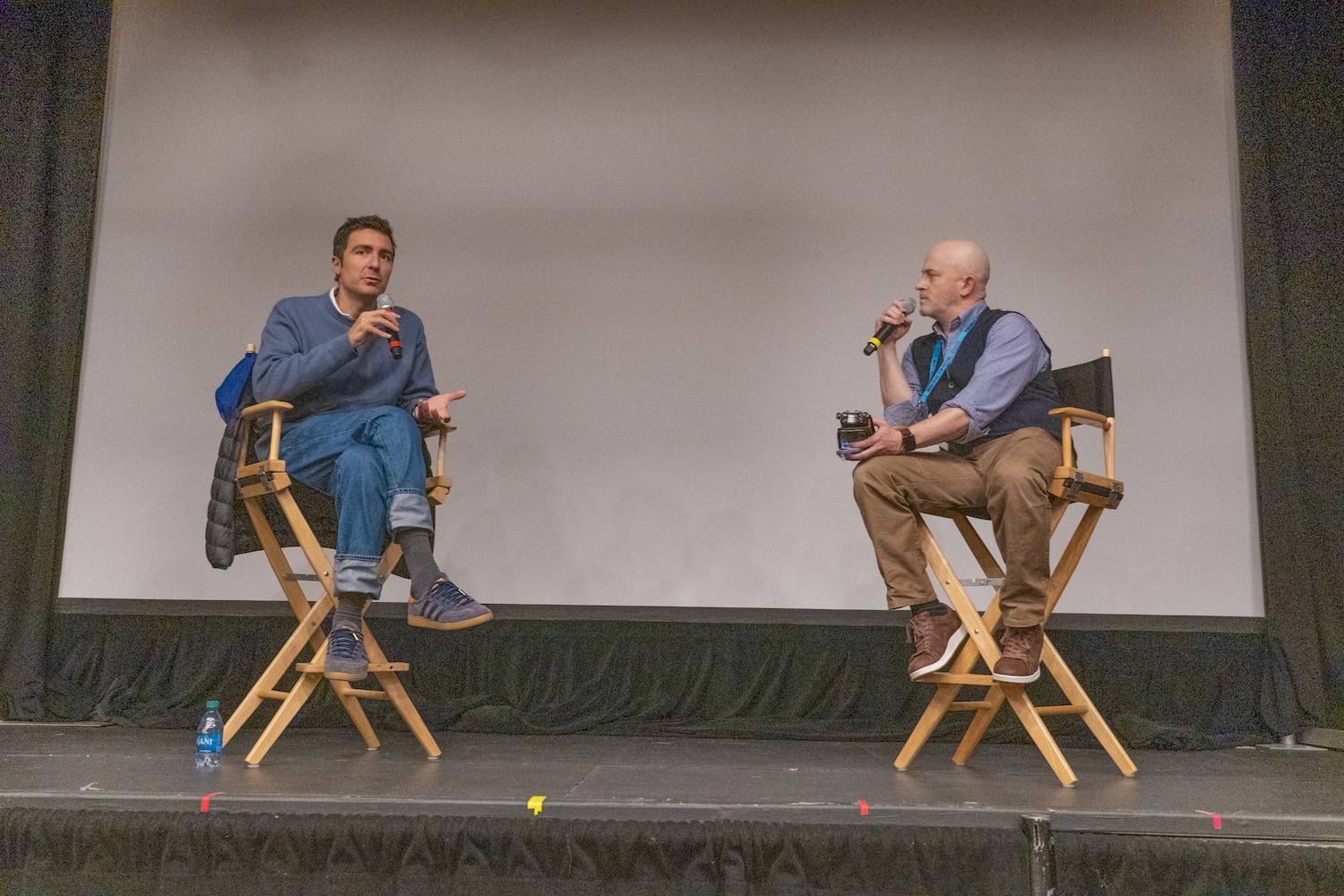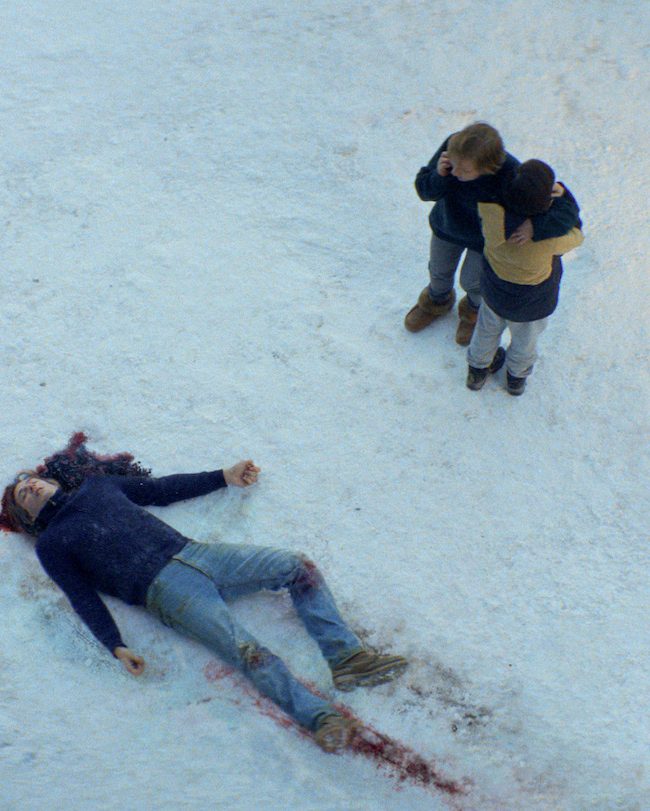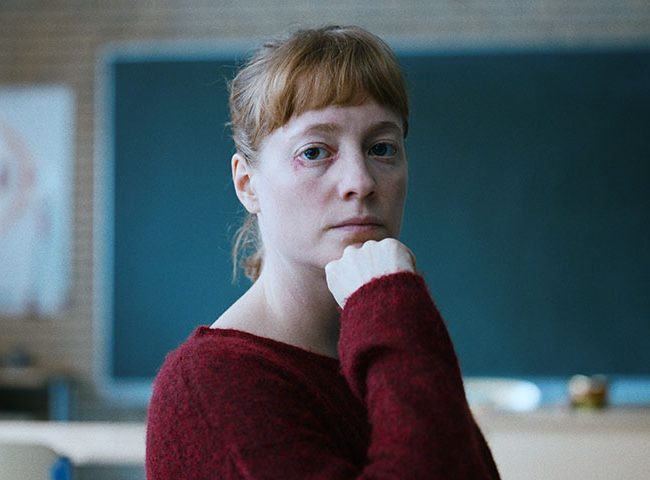A Conversation with Ilker Çatak (THE TEACHERS’ LOUNGE)

In his latest film, The Teachers’ Lounge, German director Ilker Çatak (Blurred Lines) crafts a harrowing classroom thriller, set in a junior high, where teacher and student politics collide. Centered by a brilliant lead performance from actress Leonie Benesch (Persian Lessons), the movie also features a strong cast of children who do equally marvelous work. A drama about the many shades of culpability, The Teachers’ Lounge never lets up in intensity for the entirety of its 98 minutes. At the recent Middleburg Film Festival (where I reviewed it), I moderated the film’s post-screening Q&A with Çatak, and here is a transcription of that conversation, edited for length and clarity. He speaks near-perfect English, so most of what follows is how he phrased it, though there may be a few adjustments here and there.
Hammer to Nail: You co-wrote the movie with your friend and colleague, Johannes Duncker. I know you based the story, or at least the inciting incident for the story, on your own school experiences. Could you describe that inspiration and how it led to this movie?
Ilker Çatak: Johannes and I went to high school together, and we were around 14 or 15 when one day these three administrators came into the class and just frisked us. And back then, we didn’t question that because we weren’t aware of our rights, you know? It’s not like today, where the communication loop is much shorter and one little incident becomes a huge thing because one person types something in a WhatsApp group. So back then we just took it. Johannes and I spoke about that during one of our hiking trips, and he then told me a story about his sister—who’s actually a math teacher—who had a very similar thing to what’s in my film going on in her school, with people stealing. So we remembered that incident and he told me that story and we started thinking about what could happen to a community if an allegation poisons the climate.
HtN: I heard you describe in another interview how you see the world of schools as a microcosm of society at large. How do you see that manifesting itself in this film? And in particular, as a metaphor for this current era of ours? You mentioned in that interview that this is particularly the case since 2016.
IÇ: So, every school has its own politics, even in Germany. We did a lot of research, and there are schools that are very liberal, and then there are schools that are law-and-order, with zero tolerance. Every school we went to felt like a different country: you have a dean, you have people in charge, and they are aligned with the dean (or not). And you have a school paper, which is like our media.
You mentioned 2016, which is when the Trump era began with this whole notion of alternative facts. When we were writing this, we thought, “Wouldn’t it be cool to dig into that? What is truth?” We wanted to pose that question and examine how everyone is trying to make up their own truth. You saw this especially during the pandemic, when there were different sources and everyone was referring to a different source: “Do we need to wear masks or not? Do we need to get our booster or not?” So everyone was referring to some other source, and when truth becomes a matter of belief we have a problem.
And this is actually something you can see in our debate culture. If you open up Twitter, which is now named X, it’s basically warfare. It’s so sad that our societies don’t actually talk to each other anymore. Everyone’s just trying to be right. And we were very aware of all of that going on in the world while we were writing this small little world.
HtN: Let’s talk about the cast. I understand that you wrote the part for Leonie Benesch. She first burst on the scene in 2009 in Michael Haneke’s The White Ribbon. What did you see in her that made you want to write this part for her?
IÇ: I can pinpoint that very clearly. It was always important for this character—or rather, the actor—to be able to blush. That’s one of the hardest things for an actor to do. And I knew that she could do it and I knew that she has this variety of tempi that she can do. She never tries to show her acting skill but is just there. When you write a script for an actor, there is an energy there. When we would sit together, we barely spoke. She would do something and just nail it. We would wrap up early every day. But the funny thing was that when I first met her and she read the script, she went, “OK, I like your script, I am going to do it, but I don’t actually understand where you’re going with this, and I’m just trusting you, but you need to know one thing: I don’t like children.” (laughs)
It turns out she did like children, but I thought it was funny. And when we got to the set, I said, “Don’t worry, I’ll take care of the children.” And the way it worked is that we would start the day with me explaining things and she would always be a little more of the authority figure and I would be the guy to whom they could ask questions. We would start the day with a particular mood, I would explain things, and then we would start the scene.

A still from THE TEACHERS’ LOUNGE
HtN: Speaking of the children, I understand that in Germany you can only have children on set for…3 hours a day?
IÇ: Yeah.
HtN: Which seems like an incredibly short amount of time. So, how did you manage those time constraints? And also, how did you cast the child actors?
IÇ: So, sometimes when you feel tired, you need to go for a run. You should go for a run. And that was the same thing with the time constraint. I thought that if I had so little time with the kids, I cannot rush them, because they are not going to deliver if they feel pressured. The stress that I endure cannot be theirs. I have to protect them from that. And that’s why I would really take my time in the morning to ask them questions, such as “How was your night? How did you sleep? What did you dream about? How is your relationship to your parents? How hard is it for you to apologize in life?” We would also sometimes have philosophical discussions in the morning. And at the same time, I was thinking that this is not just about making this movie. It’s also about the process of getting to know these kids, understanding their world, their view of life. And it was one of the best experiences I’ve had in my career, working with those kids.
As far as the casting went, it was very easy. It was a three-step process. The first step was gathering kids in groups of 4 to 6, and I would stand in front of them and ask them to improvise going to an environmental demonstration. So, research who Greta Thunberg is and then form an argument to debate me with. And that way I could see what they were really like. And then I would put those kids in a classroom in front of cameras. And then I would take those shots and those camera tests to a screening room and watch those with my heads of departments. After that, I would pick the kids that I liked and bring them in for interviews.
In those interviews, I would tell them three things. First of all, I’m not your boss, we’re colleagues, and I want you to have a work ethic, to go to bed early, to eat well, and to know what we are doing that day. Secondly, we are family, we are all brothers and sisters, and if one of us doesn’t feel well, we all take care of that person. And the third thing is that there are no extras. Because some parents came to me and were like, “My child doesn’t have lines.” (laughs) And I said, “I cannot write 23 kids into the screenplay.” It’s basically always the same 8 or 9 kids. But I would tell them that there are no extras. And I would also tell the production that I want every kid to earn the same money. The kid playing Oskar [one of the lead roles] earned the same money as a kid who never uttered a single line. This whole sense of us being family came from this idea that there are no VIPs.
HtN: Why did you choose to shoot your film in the classic Academy ratio of 4:3?
IÇ: I love shooting tests prior to a film. My cinematographer, Judith Kaufmann, is my favorite person in the world.
HtN: She also shot Corsage, last year.
IÇ: She also shot Corsage and she’s just so wise and I value every moment that I have with her. And for me it’s one of the sweetest things to be shooting those tests with different lenses and then to go screen them with her and to talk about what that evokes in me. And we explored different aspect ratios and different lenses, and we decided on this Academy ratio because, first of all, it’s a great portrait format. It’s a great format if you want to tell a story about a person who’s feeling isolated. It’s a little claustrophobic. And what I also love about it is the feeling of my own time in school. It’s like looking at an old Polaroid.
So, we were trying to decide if we should do it in 1.66 or 1.33 (which is 4:3), and then she said to me, “You know, I’ve never done 1.33. Let’s just try it.” And ultimately, you’re looking for ways to keep your eye fresh, and that’s how we did it. If we had shot this in CinemaScope, let’s say, I’d probably be sitting here and telling you why we did it that way. (laughs)
HtN: The score for the film is very evocative and powerful. Please tell me how you worked with composer Marvin Miller.
IÇ: We had this rule in all the departments to strip ourselves of possibilities. In the writing process, we decided to have the story only take place on the premises of that school. Let’s never leave it. In the production design, I said, “Just use blue and shades of brown.” And to my composer, I said, “I want this to be like the neuroses in my head, and you are only allowed to use 4 classical instruments. Please don’t use any more.”
In his first suggestions, he was trying to vary the theme, and I would always have to get him back to the repetition of the music. I would say, “No, no, no! Let’s not try to please the audience. It should be like this little thing in your head that doesn’t stop.” He was very afraid that it might turn off people. But we had to risk something. In filmmaking, you sometimes need to risk stuff. Especially in a film like this, which is small scale. There is no big studio behind it. It does not have to perform. And in Germany, we have the luxury of being able to make these kinds of films.
And at the same time, I was very much aware of my audience, too, because I said to my editor, for instance, “You need to watch this Safdie Brothers film called Uncut Gems.” It’s incredible. It gave me a heart attack because you cannot breathe in that film. And I wanted this film to have that pressure, too, because I get bored very quickly when I watch a film, and I didn’t want people to be bored by this.
HtN: Well, I certainly wasn’t bored! Thank you so much for making the film and for talking to me.
IÇ: Thank you.











